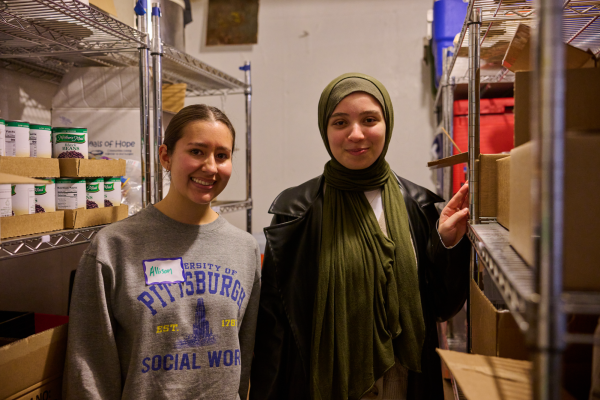Pitt students develop Potluck app to connect people through food
John Blair | Senior Staff Photographer
Joe Slomowitz, Avi Moses and Oliver Yao, the co-founders of Potluck.
March 29, 2022
During a layover in Arizona several years ago, Oliver Yao, a junior economics major, made a new friend on Couchsurfing, a social network aimed at connecting travelers with locals. While the two shared a meal, Yao began to realize the uniting power of food.
“That’s when I thought of trying to preserve what Couchsurfing started, which is a movement of people having these authentic experiences with strangers, coming together, trusting each other and bonding over something as simple as food,” Yao said. “People operate on a gift economy where people provide their hospitality to others without expecting anything in return.”
Now, Yao is creating the app Potluck with junior Joe Slomowitz and sophomore Avi Moses to bring people together one meal at a time. Potluck is a platform where users can connect with each other online and meet up to have a meal. Potluck is still in development, but they have a growing community of interested individuals.
In Potluck’s earliest stages, Yao and Slomowitz placed second in Pitt’s Big Idea Blitz competition in February 2021. After Moses joined their team, the three co-founders entered Potluck in the Randall Family Big Ideas Competition and placed as finalists. The winners will be announced later this semester on April 12.
Slomowitz, a marketing, business information systems and supply chain management major, said the app is based on food to encourage genuine interactions.
“What’s better at bringing people together than food?” Slomowitz said. “There’s something very special about being able to sit down with others for food, and to be able to feed somebody.”
Potluck will exist to bridge divides between people, Yao said.
“We’re trying to tackle a global challenge of bridging people across cultures, religions, backgrounds, political views — all kinds of divides, especially with our online social media bubbles,” Yao said. “This is a way for people when they’re traveling, or even in their own local communities, to meet strangers in a safe but authentic way … The beauty in those unexpected moments — whether it’s short or long — it’s always worthy to be cherished and to continue to make those moments happen.”
While the app is in development, the team has been holding “test Potlucks” for a video blog series, featuring meals and conversations with members of Pitt cultural organizations. Slomowitz said interest in Potluck is steadily growing.
“This semester we’ve been really focusing on our vlog series and trying to demonstrate to people what Potluck is. At the same time, we have a Discord server and a waitlist where people can express interest,” Slomowitz said. “It’s not big yet, but we’re definitely making progress and getting some traction and interest. It’s been really fun to reach out and talk to people about what we’re trying to do.”
The vlog series, titled “What’s Cooking in the Potluck?” has two episodes so far. The team dined on borscht and pierogies with Pitt’s Ukrainian Cultural Club, and tasted a trifle with Pitt’s Irish Club. Moses, a marketing and supply chain management major, said the vlogs have been an effective method of attracting interest.
“The positive feedback we’ve received from just releasing our first vlog two Thursdays ago, really putting our marketing efforts down just this month at the start of March, having this growth on Discord already,” Moses said. “I know it’s small, but in one month, it’s amazing. If this keeps happening, this could be great.”
Slomowitz said the app’s official launch date is undetermined, but fostering a Potluck community with vlogs is keeping them busy in the meantime.
“We’re still trying to gauge interest, but also doing these Potlucks and doing these vlogs,” Slomowitz said. “We have a general goal of 200 users on our waitlist as a threshold … in the meantime, we’re going to focus on the Discord, having these meals, getting all these Potlucks together, and see who we can bring together, what videos we can capture and what cool moments we can have.”
The biggest challenge, Yao said, is growing a diverse user base on a service whose functionality is defined by the number of existing users.
“You wouldn’t use Facebook if no one else was on Facebook. It’s the network effect — the more people we have, the more value it’ll provide. [We need] those initial people who can really believe in us and be willing to use Potluck, even in its nascent form,” Yao said. “The idea for Potluck itself can come in many shapes and sizes … The challenge is reaching all these demographics.”
Moses said Potluck differs from traditional social networks because it’s based on real-life interaction.
“The distinction [is that] the goal is for people to meet up in person rather than staying on the app,” Moses said. “It’s for them to form connections.”
Slomowitz said the act of sharing food is important to his Jewish heritage, and hopes Potluck will promote cultural exchange.
“We have a holiday coming up in Judaism called Passover, and one of the lines you read during Passover is “all who are hungry, come and let them eat.” At the essence of it, what we describe with that line is … to be able to welcome somebody in for food, to be able to provide somebody food, there’s something very meaningful and powerful,” Slomowitz said. “[Food is] a tool where you can share cultures.”
Dining is a universal ritual, and sharing it with others is significant, Moses said.
“Eating a meal – breakfast, lunch or dinner – is a break from your busy world … To be able to share that with someone else is special,” Moses said. “Creating a way for people to harness the power of food is great.”








